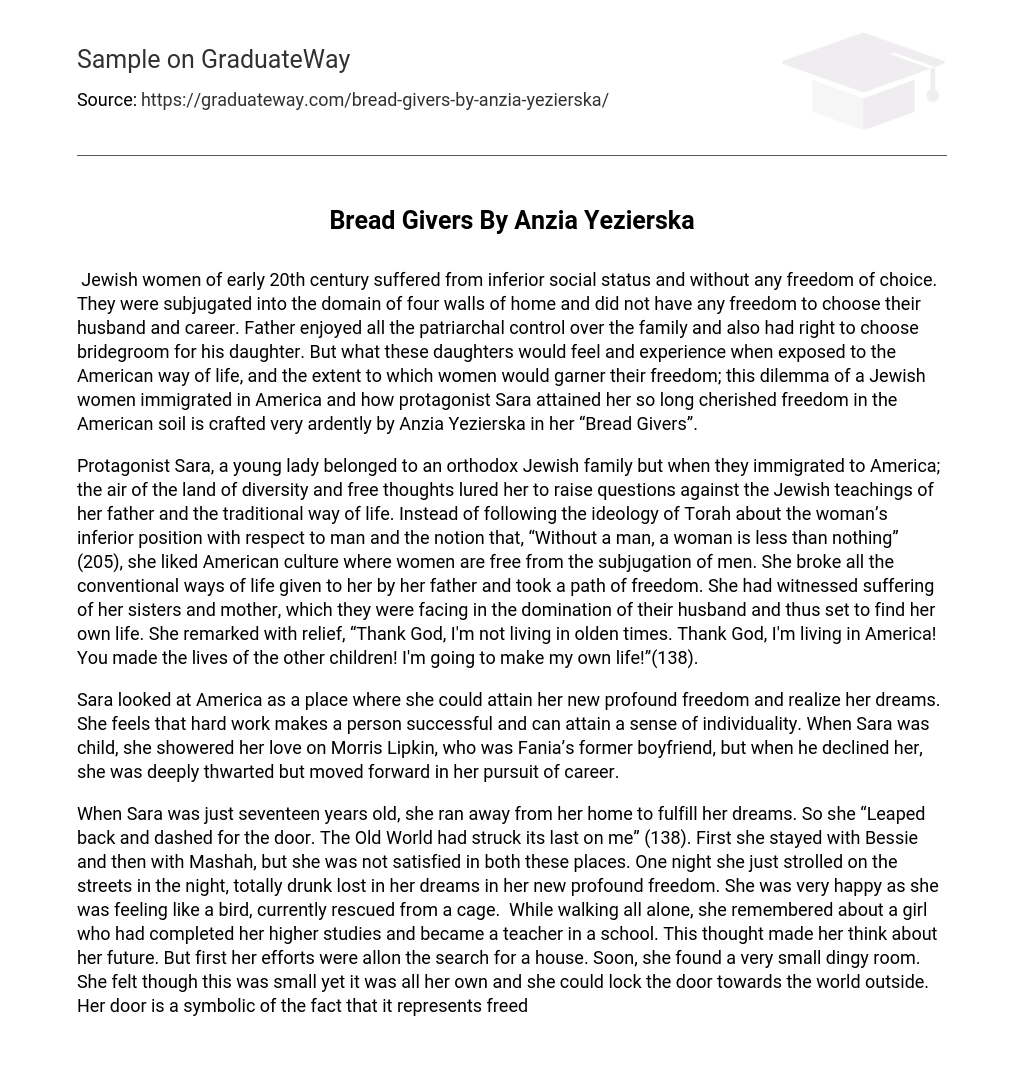Jewish women of early 20th century suffered from inferior social status and without any freedom of choice. They were subjugated into the domain of four walls of home and did not have any freedom to choose their husband and career. Father enjoyed all the patriarchal control over the family and also had right to choose bridegroom for his daughter. But what these daughters would feel and experience when exposed to the American way of life, and the extent to which women would garner their freedom; this dilemma of a Jewish women immigrated in America and how protagonist Sara attained her so long cherished freedom in the American soil is crafted very ardently by Anzia Yezierska in her “Bread Givers”.
Protagonist Sara, a young lady belonged to an orthodox Jewish family but when they immigrated to America; the air of the land of diversity and free thoughts lured her to raise questions against the Jewish teachings of her father and the traditional way of life. Instead of following the ideology of Torah about the woman’s inferior position with respect to man and the notion that, “Without a man, a woman is less than nothing” (205), she liked American culture where women are free from the subjugation of men. She broke all the conventional ways of life given to her by her father and took a path of freedom. She had witnessed suffering of her sisters and mother, which they were facing in the domination of their husband and thus set to find her own life. She remarked with relief, “Thank God, I’m not living in olden times. Thank God, I’m living in America! You made the lives of the other children! I’m going to make my own life!”(138).
Sara looked at America as a place where she could attain her new profound freedom and realize her dreams. She feels that hard work makes a person successful and can attain a sense of individuality. When Sara was child, she showered her love on Morris Lipkin, who was Fania’s former boyfriend, but when he declined her, she was deeply thwarted but moved forward in her pursuit of career.
When Sara was just seventeen years old, she ran away from her home to fulfill her dreams. So she “Leaped back and dashed for the door. The Old World had struck its last on me” (138). First she stayed with Bessie and then with Mashah, but she was not satisfied in both these places. One night she just strolled on the streets in the night, totally drunk lost in her dreams in her new profound freedom. She was very happy as she was feeling like a bird, currently rescued from a cage. While walking all alone, she remembered about a girl who had completed her higher studies and became a teacher in a school. This thought made her think about her future. But first her efforts were allon the search for a house. Soon, she found a very small dingy room. She felt though this was small yet it was all her own and she could lock the door towards the world outside. Her door is a symbolic of the fact that it represents freedom and sense of independence and self- identity. But Sara did not stop here, and moved forward in her quest of carving her life and fruitfully utilizing her American dreams. She took to ironing and worked for ten hours every day, and two hours she would spend on studying in night classes.
Sara’s main motive was to attain individuality and she could go to any extent to attain that. She refused to visit her home to meet their mother, only because she wanted to finish her schoolwork. For Fania and Bessie, her crave for education was madness just like their father’s passion for Torah. Fania could not believe her ears at Sara’s refusal and was forced to say, “Come, Bessie. Let’s leave her to her mad education. She’s worse than Father with his Holy Torah” (178).
As Sara entered the college, she faced racism from her friends and felt segregated and aloof and found trouble in learning geometry, but her willpower made her steer clear all the subjects and she finally graduated herself. During college days, she surprised every body by winning essay competition. When her name was announced, “All the students rose to their feet, cheering and waving and calling my name, like a triumph, ‘Sara Smolinsky—Sara Smolinsky!’” (234).
Back at New York, she got a job as a teacher in a public school; still she felt it was only a one step towards the ladder of her success. Now when she had become a successful and accomplished woman, still she felt something missing in her life and that was her family. When her mother passed away, she felt a sense of vacuity in her heart, which could be only fulfilled, with her family by her side. She felt, “I had failed to give Mother the understanding of her deeper self during her lifetime. Let me at least give it to father while he is yet alive. And so, everyday, after school, I went to see him” (257).
She was also craving for true love and she finally found a right man for herself in a form of Hugo who liked her love for learning and teaching. With Hugo, she rediscovered the essence of family life and happiness.
Through will power, endurance and struggle, woman are attaining laurels in their professional lives, yet for them family is very important. Though Sara could not tolerate his father’s authoritative attitude and orthodox values, and ran away from home, yet deep inside her heart she was craving to give and attain love for her family-this was her strength, and finally it was to the family only she returned back.
WORKS CITED
Yezierska, Anzia. “Bread Givers.” New York: Persea Books, 1975





